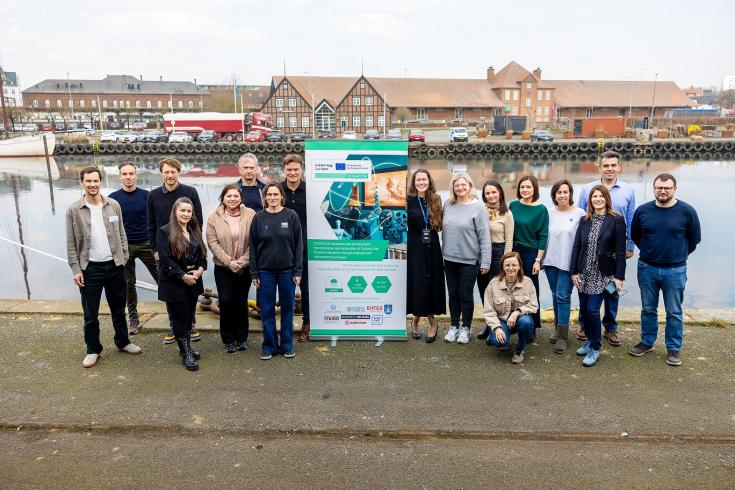18-20/3/2025, Kolding (DK), The 2nd Exchange of Experience
The second Exchange of Experience of the project CCSI4CCSI (Cultural and Creative Sectors and Industries for Collaboration, Competitiveness, Sustainability and Innovation) took place from 18th to 20th of March 2025 in Kolding (Denmark), a Creative City of Design, featured within UNESCO Creative Cities Network (UCCN). The excellently organized program, hosted by Business Kolding, combined presentations from local creative ecosystem actors, good practices from CCSI4CCSI participating regions, a sharing session of CCSI needs research findings, an interactive co-creation workshop and study visits.
This 2nd transnational meeting focused on the exchange of good practices related to the digital transition of the Cultural and Creative Sectors and Industries.
More specifically, Day 1 was held at the premises of the start-up hub that “Business Kolding” accommodates, situated at the harbor warehouse (Pakhuset). The participants were warmly welcomed by Mr. Morten Bjorn Hansen, CEO of Business Kolding.
CCSI4CCSI Project’s Lead Partner, Region of Central Macedonia, represented by Ms. Anthoula Nikopoulou, made a short introduction with an overview and status of the project. This was followed by an inspiring presentation on design thinking by Mr. Mikael Sorknaes, CEO of “Kolding Kommune”, who gave a different perspective aspiring the Municipality’s vision “Co-Design 4 Life” to the development of the cultural and creative sector of the region followed by interesting talks on collaborative community design.
Representatives of stakeholders organisations from each participating region in the project shared very interesting cases, such as the initiatives relating to transformative digital innovation in CCIs from the Aristotle University of Thessaloniki (AUTH), and the DIGI-ORCH project from “KIKLO” a spin-off company of AUTH, which facilitates the development of a model system for the visualization of information of the cultural activities and events (Central Macedonia - Greece). Furthermore, a case focusing on the development of the digital skills for creative professionals was presented by Algebra University (Croatia), while the digitalization and recreation of the Royal Yacht Dannebrog was highlighted by MDT, whose expertise lies in lightweight designs and constructions through 3D printing, particularly with a focus on complex, tailor-made products and curved structures for the entertainment industry (Kolding, Denmark). Additionally, a presentation on Malopolska’s Virtual Museums was delivered by MIK, which is aiming to digitalize the finest and most valuable items of cultural heritage from museums (Małopolska region, Poland), whereas the Howest University of Applied Sciences in Kortrijk unveiled Devine ‘s activities that empower its students in digital innovation (Flemish Region, Belgium).
In the afternoon of the same day, within the framework of study visits, the participants had the opportunity to learn more about digital innovations and interactive experiments that align both physical and digital materials and integrate open-source software and electronics into projects. A significant part of the study visit included presentations and discussions among innovation experts from Techsoft, Play X Tech, and Nexttech.
Day 2 commenced with a cultural city walk guided by the “Museum Kolding” and was followed by the co-creation workshop on trends’ monitoring framework for CCSIs, that took place at the impressive and playful “Kolding Design School”.
The participants of the 2nd Exchange of Experience were welcomed by Ms. Anette Flinck, International Relations Manager at the Kolding Design School, who made a throwback to the school’s history and highlighted current educational opportunities.
Following this introduction, a presentation about the “FLUKS” project was made by two school associates, Ms. Louise Aagaard and Joan Pedersen, sharing with the participants their initiatives that aim to involve young people in cultural events at a volunteer level.
Afterwards, the representatives of the CCSI4CCSI project partners presented the results of their research for assessing the needs of the Cultural and Creative Sectors and Industries.
Then, together with their local stakeholders worked in teams to discuss research results, analyse trends and findings, assess whether these findings are valuable or not, so as to eventually co-design the monitoring framework with the proper tools. The workshop was led by Ms. Anne Mette Bjerre Hansen, Facilitator and Experienced Designer with a strong history of working in CCIs, especially in the fashion industry.
Day 3 was dedicated to the meeting of the project's Steering Committee, during which the actions of the second semester were reviewed, issues of preparation and submission of the second progress report were discussed, and the next actions were planned.

